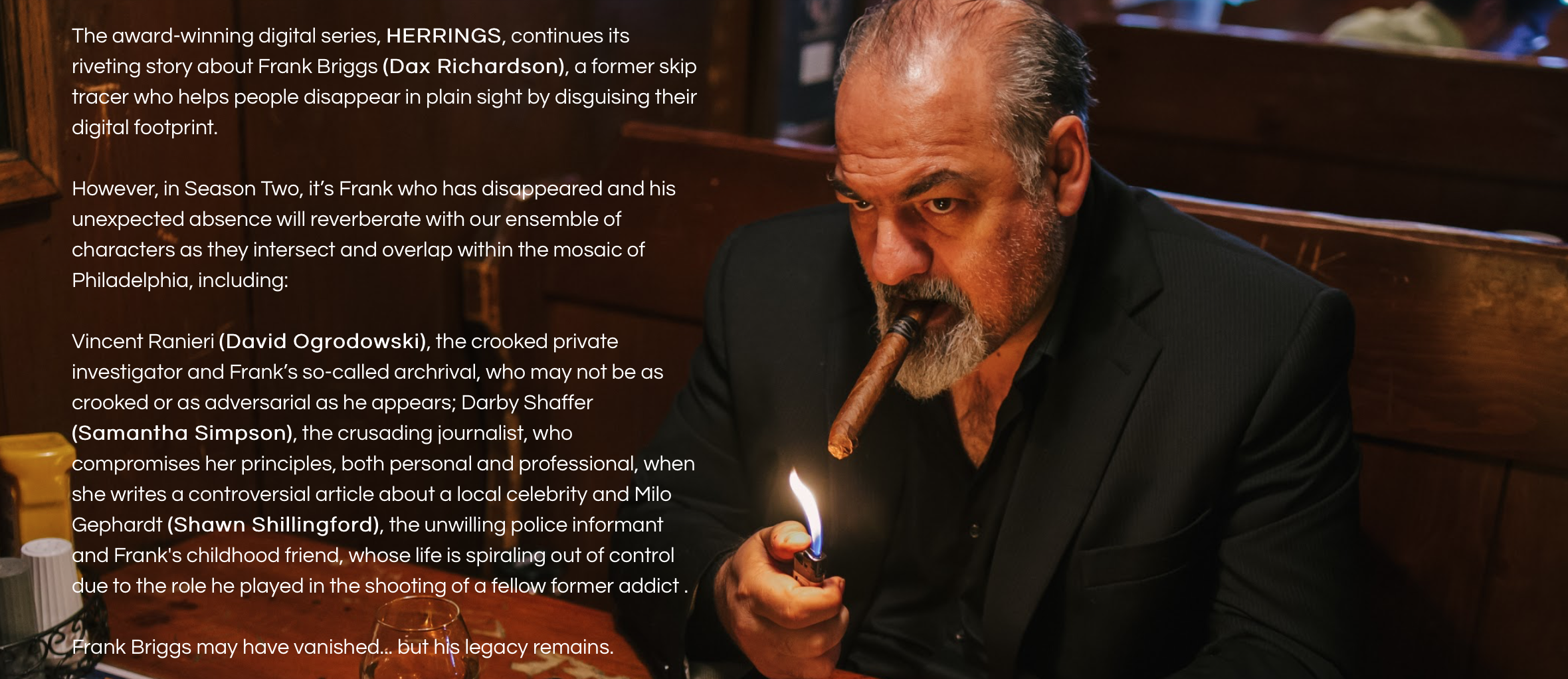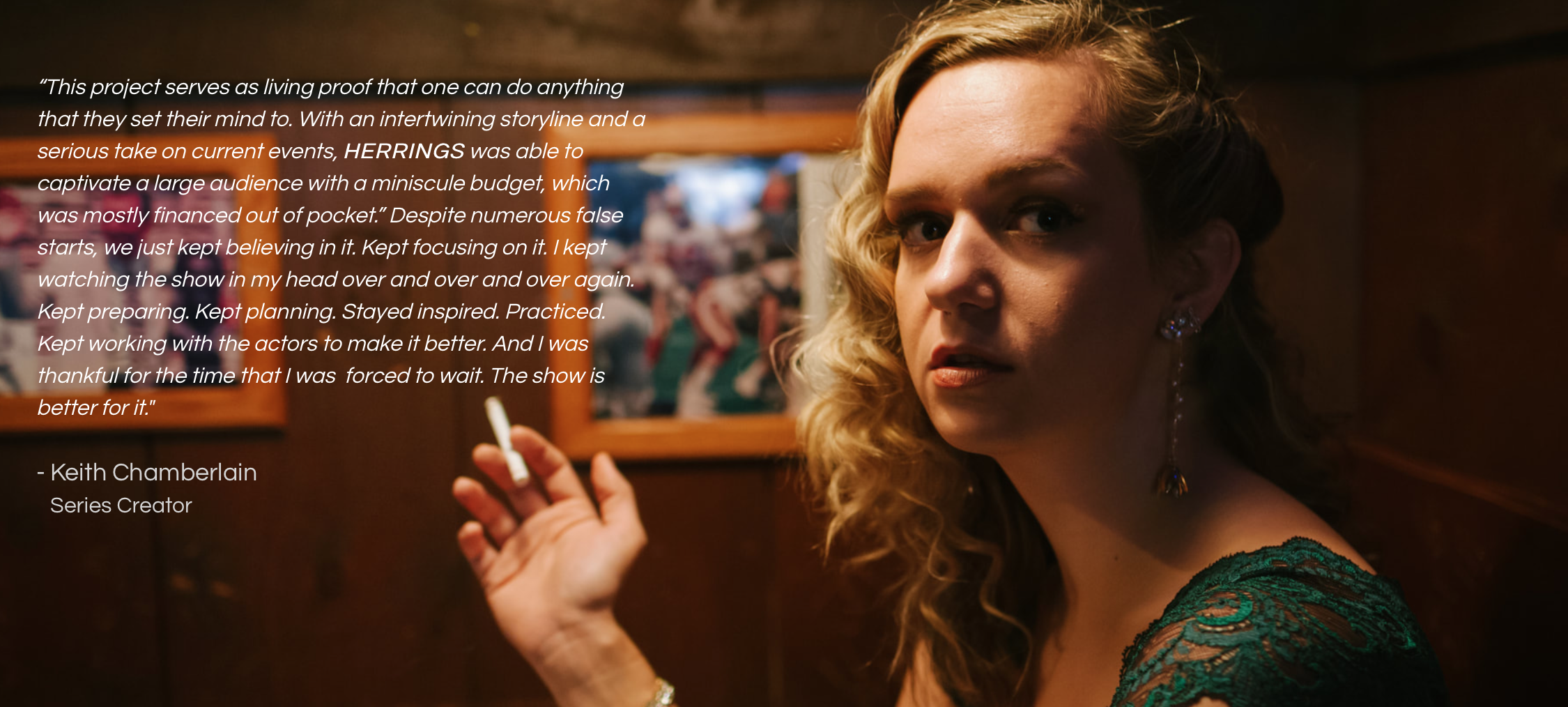After much success with Season 1 & 2, Herrings is excited to be coming back for Season 3. The independent web series that has gain recognition nationally and internationally and is now looking to you for some support, DIBS chatted with creator Keith Chamberlain…
Keith Chamberlain is an award-winning filmmaker currently living in southern New Jersey. Keith strives to tell meaningful stories that capture the truth of the human condition as well as challenges society’s views and beliefs. He has written and directed several short films that have played in various film festivals. Keith’s award winning films have been screened at festivals around the world, including Golden Door International Film Festival, Pittsburgh Uncut Film Festival, Seoul Web Fest, NJ Web Fest and Hang Onto Your Short Film Festival among other venues.
Why is it important to raise money for independent filmmaking?
Independent film offers visual artists more authorship and promotes new and exciting approaches to storytelling in cinema. That’s what we as filmmakers and content creators are trying to do here: tell stories. However, for that to happen, we first need a team of skilled professionals working diligently in the trenches from a multitude of angles, who are not only willing but happy to pour their blood, sweat, and tears into making projects like Herrings, a reality. So, it's only not only fair but ethical that those professionals to be paid for their work.
Why should people donate to Herrings?
A lot of times our cast and crew are working on a film below their normal rate because it serves as a passion project for the whole team. Your money will go towards paying the cast and crew what they deserve to be paid, and ultimately providing the financial means to help each and every one of us give it our all to make Herrings, the narratively compelling series we know it can be.
What will people get when they donate?
Well, it can range from receiving a social media shout-out from a member of the cast to t-shirts, signed posters, screenplays, receiving a producer credit or even having a walk-on role on the show!
Where could people watch this?
People can check out Seasons 1 & 2 of Herrings at www.herringsseries.com
How much does one have to compromise as a filmmaker because of financial restrictions?
You ever heard of the expression, "Mo' money, mo problems"? Well, in film-making, it's "mo money, less problems" because when you're dealing with an ultra-low budget production like this one you have to make a lot of sacrifices. In the case of Herrings, I would have to say locations and schedules have been the biggest compromises thus far. For example, I had a scene in the first episode of season two that was supposed to be set in a high-price fancy restaurant with a dozen extras but because of my budget none of them would accommodate an ultra-low price production like mine, I ended up shooting the scene in a much smaller restaurant/lounge outside of Philadelphia with only four extras and two of them were crew members!
So often we hear about the lack of original stories. That we’ve all “seen it before.” How do you stay fresh in the face of an idea like that?
Well for starters, I avoid a lot of television during my writing process because that's one surefire way to end up with something that people have seen before. The other and for me, this is huge, is you'll hear a lot of experienced filmmakers say "film what you know" and I don't follow that advice at all. In fact, that expression may be one of the biggest reasons you're seeing a lot of the "same 'ole, same 'ole", that you're talking about. So, for Herrings, I went the opposite direction. This is a show about a subject I didn't know or personally experienced and as such, a lot of research went into making sure I get my facts right. This is also a show that is not just outside the viewers' comfort zone but my own as well, which is why think it has resonated with some many people.
What does independent filmmaking bring to a local community?
Well, I know people who, because of the show, have visited the bookstore where we filmed our first episode (The Book Asylum in Blackwood, NJ) and then ended up purchasing books while there were there. Independent filmmaking can be a boon to a small business trying to survive in this post Amazon-Starbucks-Walmart world.
What could viewers expect for Herrings Season 3?
In our second season the stakes are higher with the introduction of new characters and the unexpected return of some old ones. Revealing anything more would be a spoiler but what I can say is, everything is connected...
How long is this crowdfunding going to go on for?
Our current crowdfunding campaign will run until February 6, 2020. After that, there may be a Phase 2, but that all depends on how much we raise this go around.
What are some other ways in which people can support Herrings?
The best way to support Herrings is by making a contribution to our Indiegogo campaign. However, we understand that circumstances may prevent people from donating money to our campaign. However, if they're as invested in the idea as we are, then they can help by passing our campaign along to their network via a quick Facebook status or maybe wrap it up in a Tweet. More eyes means more opportunity for us to share this wonderful project and for us that's a big win.
And if anyone has a business (tattoo parlors, cafes, bars, office space, restaurants) in the Lehigh Valley area, they'd like featured in an episode, please me via email at herringsshow@gmail.com, at your earliest convenience.
Looking to show some support by donating? click HERE to head over to the INDIEGOGO Campaign!
Here are just a few of the awards and nominations HERRINGS has picked up over the last few years.



